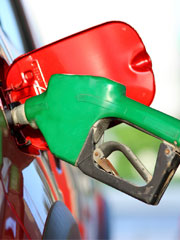
Few issues are as important to consumers as the cost of gas for their cars, and the price they pay to heat, cool, and light their homes. The FTC keeps a weather eye on energy markets, closely scrutinizes mergers and acquisitions in the energy sector, and monitors environmental marketing to make sure it is truthful and based on solid scientific evidence.
The FTC challenged an acquisition of terminal and pipeline assets, charging that it would lead to higher gasoline and diesel fuel prices in Maine. The Commission also required two of the nation's largest propane distributors to carve out overlapping assets to preserve competition for propane exchange cylinders used for backyard barbeque grills.
The FTC opened an investigation into pricing anomalies among gasoline refiners; issued a report on the key factors that influence gas prices; and tracked daily wholesale and retail gasoline and diesel price data to identify anticompetitive activities. The FTC and the Commodity Futures Trading Commission signed an MOU to facilitate information sharing in investigations in petroleum and other markets.
On the home front, five window marketers settled FTC charges that they made deceptive energy efficiency and cost-saving claims about their products. The Commission also took action against retailers who allegedly failed to post requiredEnergyGuide information on their websites about major home appliances; and reached a settlement that stops marketers from making bogus claims that their fuel device could boost automobile gas mileage by at least 50 percent. The FTC sought public comments on proposed changes to its Appliance Labeling Rule, which requires energy efficiency labels for major household appliances and other consumer products.
Enforcement Highlights
- Irving Oil: FTC Conditions Irving Oil's Proposed Acquisition of ExxonMobil Assets in Maine
- AmeriGas: FTC Puts Conditions on AmeriGas's Proposed Acquisition of Rival Propane Distributor Heritage Propane
- Online Appliance Retailers: FTC Settlement Imposes $100,000 Fine Against Online Retailer for Failing to Post Required EnergyGuide Information for Appliancess
- Window Marketers: Window Marketers Settle FTC Charges That They Made Deceptive Energy Efficiency and Cost Savings Claims
- Dutchman Enterprises: FTC Stops Marketers From Selling Phony Fuel Economy Devices
Policy Highlights
- Report: Gasoline Price Changes and the Petroleum Industry: An Update
- Report: 2011 Report on Ethanol Market Concentration
- Agreement to Share Information on Energy Investigations (FTC, CFTC)
- Staff Comment: Assessing the Effects of Proposed Horizontal Mergers on Market Power
- Public Comments: Energy Labels for Home Heating and Cooling Equipment
Outreach Highlights
- Video: Shopping for Light Bulbs
- Consumer Education: Shopping for New Windows Infographic
- Business Education: The FTC “Lighting Facts” Label: Questions and Answers for Manufacturers
